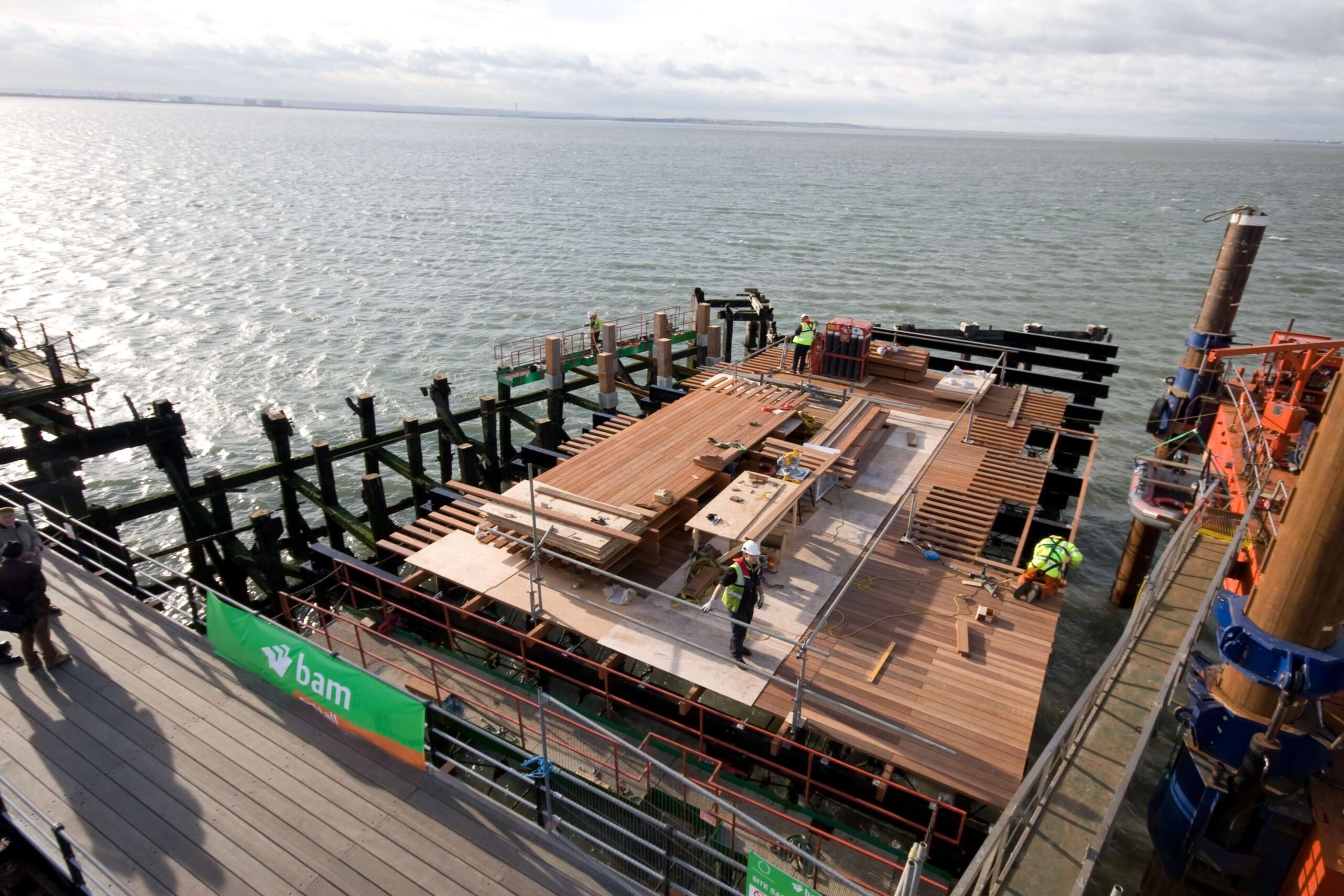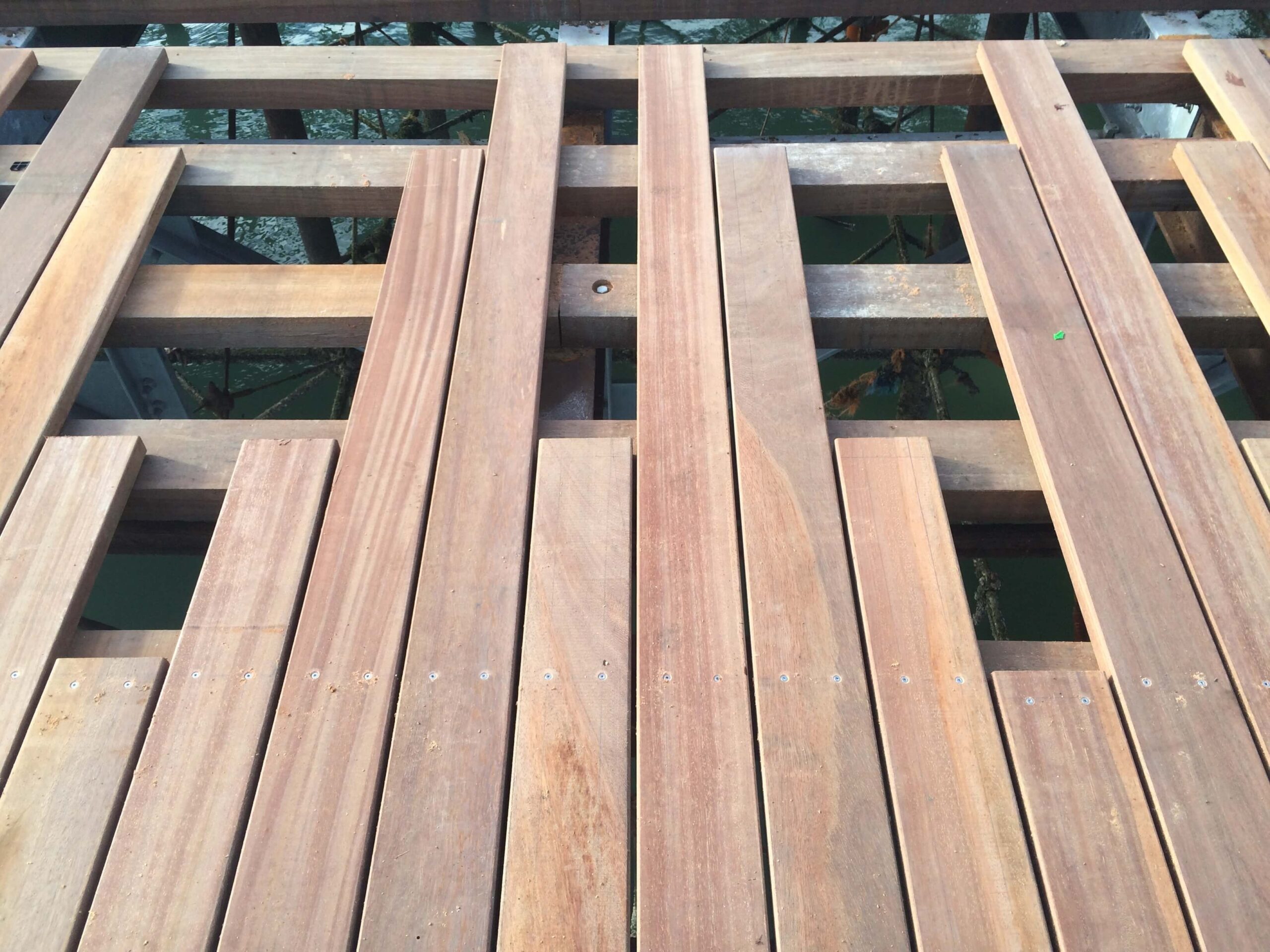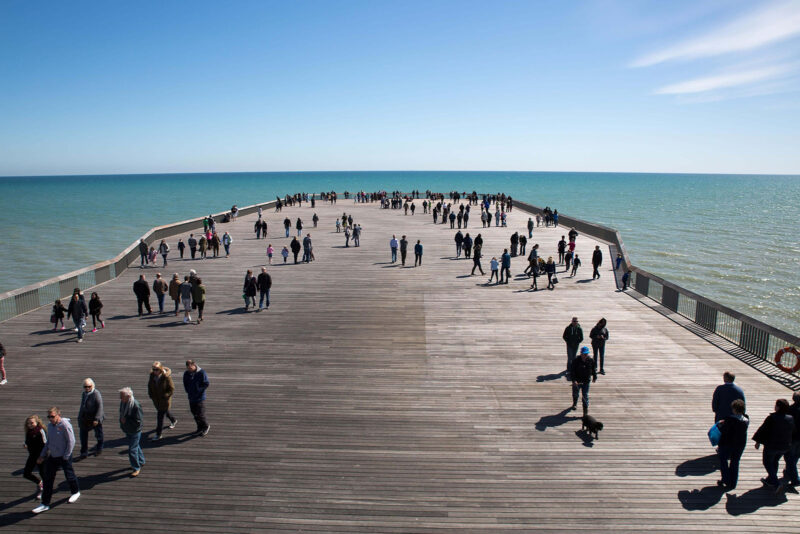Using timber for piers
Published: 26/02/19 By: Mike Bekin
EcoChoice have a had strong presence in the marine construction industry for many years, and in particular we have specialist experience in delivering timber components to piers, pontoons and marinas. We know that these products need to perform under exceptional circumstances, which is why it is important to deliver the most durable timber products available. In this article, we will look at the type of timber that we use for piers, why we use it, and will look at two of the piers that we have helped with in recent years – Southend Pier and Hastings Pier.
Strong and Durable
The main timber species that we supply for marine works is Ekki, which we source from FSC certified forests. We will explain why it is so important to be FSC certified later in this article, but firstly we explain why Ekki and what it is.
Ekki, also known as Azobe, is one of the hardest and most durable timber species on the planet. It is a tropical hardwood that grows in West Africa, and is ideal for piers because of its natural strength and durability. As a D70 class timber with cross grain construction (its fibres are not aligned, so it’s hard for it to split), Ekki has just the right mix of strength to span and withstand different types of loads over a long time. In terms of durability, which is of course essential for something that is exposed to frequent wetting and sea water, tropical hardwoods such as Ekki can outlast steel and concrete in sea water since Ekki won’t corrode. Although Ekki can be affected by biological attack and degradation, its natural inbuilt defences (the famous essential oils) protect it from rotting and being attacked and broken down by fungi and marine organisms. Being naturally durable also means that the timber doesn’t have to rely on being treated by harmful chemicals to protect it, which could otherwise seep into the oceans causing damage to the natural environment, getting into the food chain through sea creatures and into the water supply.
With Ekki being one of the strongest and most durable species of hardwood timber it makes it ideal not only for piers but also other civil and marine projects such as groynes, fenders and piling. Other benefits to using timber are the cost – timber is cheaper than steel on a volume basis, and it looks a lot nicer than either steel or concrete too. But there is one other key point when it comes to using timber for piers and other marine works.
Sustainability
 As we have said above, we know that the products we provide have to perform under exceptional circumstances. But it is also incredibly important that the timber we provide be sustainable. One of the major advantages of using timber for any type of construction is that it is a renewable resource which can be effectively carbon neutral. But there is a lot more to take in to consideration than that.
As we have said above, we know that the products we provide have to perform under exceptional circumstances. But it is also incredibly important that the timber we provide be sustainable. One of the major advantages of using timber for any type of construction is that it is a renewable resource which can be effectively carbon neutral. But there is a lot more to take in to consideration than that.
Over the last three or four decades, people have become more concerned about where the timber they buy and use comes from as they have become more informed and educated about the impact they are having on the planet. Key to this has been an awareness of deforestation.
This increase in awareness of deforestation and the impact that it has had on our environment has led many people think that you can’t buy or use any tropical hardwoods, such as the Ekki, which is so ideal for piers and other marine projects.
However, that is not the case. You can still buy and use tropical hardwoods, you just need to make sure that the timber you are purchasing and using comes from independently certified sustainable sources.
Tropical hardwoods come from an area which includes Central America, the Caribbean, as well as much of South America, Africa, South East Asia and India. Many of these are developing countries, and timber sourced from here has long been associated with deforestation and corrupt practices. Illegal deforestation often goes hand in hands with human rights abuses, the hunting of endangered animals and the destruction of habitats. Whilst a lot of illegal logging does occur in the Tropics, it doesn’t mean that all tropical hardwood is unsustainable. The easy way to guarantee a tropical hardwood comes from a sustainable source is to use timber that is FSC certified.
FSC stands for Forest Stewardship Council. Purchasing and using sustainable tropical hardwoods from FSC sources, such as an FSC forest in the Amazon, doesn’t just do less damage to the rainforest, it actually helps the rainforest. The FSC is an independent not for profit organisation that promotes responsible management of the world’s rainforests, ensuring that the wood they certify comes from sustainably managed forests. The FSC has an independent audit system for sustainable forest management, selecting and cutting trees in a way that respects the forest to ensure the forest is there for future generations and that no damage is done to the environment, people and the wildlife that live in it. When you buy and use FSC certified timber, you are helping FSC forests to remain economically viable, and thus enabling the FSC to continue protecting those forests. The FSC certification system is recognised around the world. We provided FSC certified timber such as Ekki, Opepe and Cumaru for all of the piers and other marine projects that we have been involved in, including the following two.
Southend and Hastings Piers
 EcoChoice has provided durable marine hardwood decking for Hastings and Southend Piers as well as many other sea, river and canal works. We are now going to look at two – Hastings Pier and Southend Pier.
EcoChoice has provided durable marine hardwood decking for Hastings and Southend Piers as well as many other sea, river and canal works. We are now going to look at two – Hastings Pier and Southend Pier.
Southend Pier
Southend Pier is the longest pleasure pier in the world after the one in Progreso on the Yucatan peninsula in Mexico. A Grade II listed building, it extends 1.34 miles (2.16km) into the Thames Estuary and was originally built in Southend-on-Sea in 1830.
EcoChoice provided the contractor with timber panels for the pier rather than loose timber boards in order to save them time and money, as well as reduce health and safety risks.
With a focus on sustainability, we introduced a number of timber species, rather than just one specific timber species for the project. This helped to reduce the pier’s ecological footprint even further than it already would have been, as a natural forest can cope better with demand when using multiple species rather than one single species.
Hastings Pier
With Hastings Pier however, we just provided one timber species, Ekki, which was used for both the joists and the deck planks. Hastings Pier, also known as “The Plank” was built in 1872 but suffered major damage as a result of a storm in 1990 and was almost completely destroyed by a fire in 2010. The rebuilding and regeneration of the pier following this was a huge community project which was overseen by the Hastings Pier Charity that transformed what was essentially a wreck into a stunning new pier. We were very pleased to provide boards for the pier, and supplied them at fixed length so that there was virtually no wastage on site. The pier is 11,000m2, most of which is decked with 35x145mm planks which were all supplied by EcoChoice. We had to deliver them in bundles that were no heavier than one ton in order to comply with building restrictions at the pier. We also provided custom made joists, handrails and steps. The pier reopened in 2016, and we were absolutely thrilled when Hastings Pier was chosen as the winner of the RIBA Stirling Prize 2017 for architecture.
Who are EcoChoice?
EcoChoice are specialist suppliers of certified timber and recycled plastic products for water and exterior works, from decking to piers and footbridges. We were formed in 2005 with the aim of promoting FSC certified timbers to the UK construction industry, helping customers to engage in a sustainable way instead of turning away from both the deforestation and plastic waste problems. We offer products from a wide range of different timber species, including Ekki, Ipe, Cumaru and Iroko.
We are passionate about supplying our clients with independently certified timber products while encouraging responsible and sustainable practices at the source level. To find out how we can help you and to get a quick, no-obligation quote, please call us on 0345 638 1340, email us on info@ecochoice.co.uk or for more information about our sustainable timber products, please visit our website https://ecochoice.co.uk/
